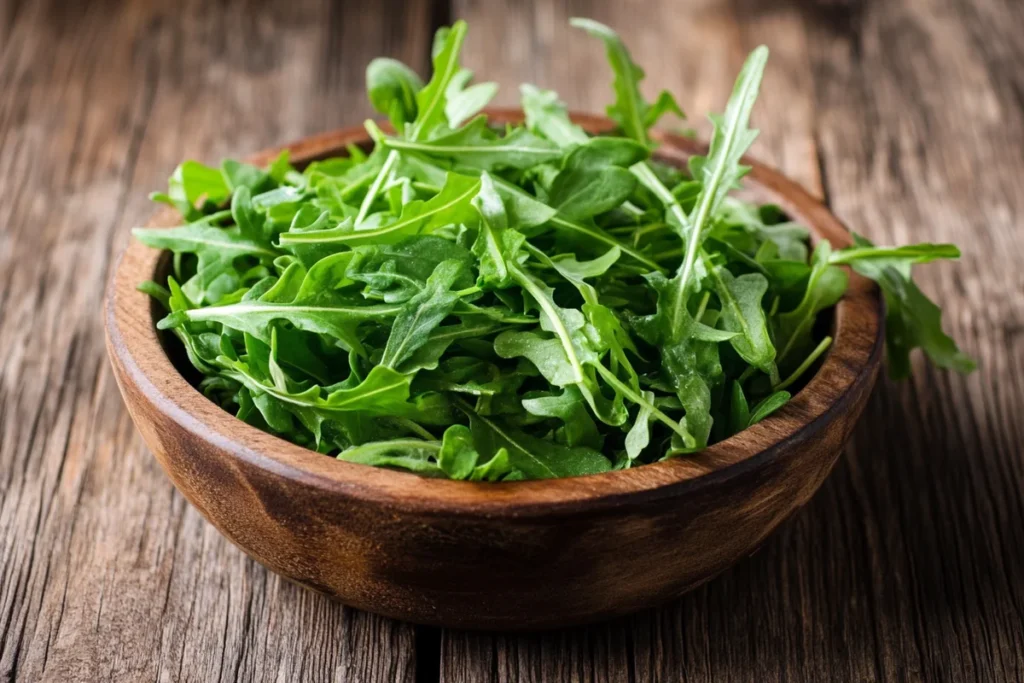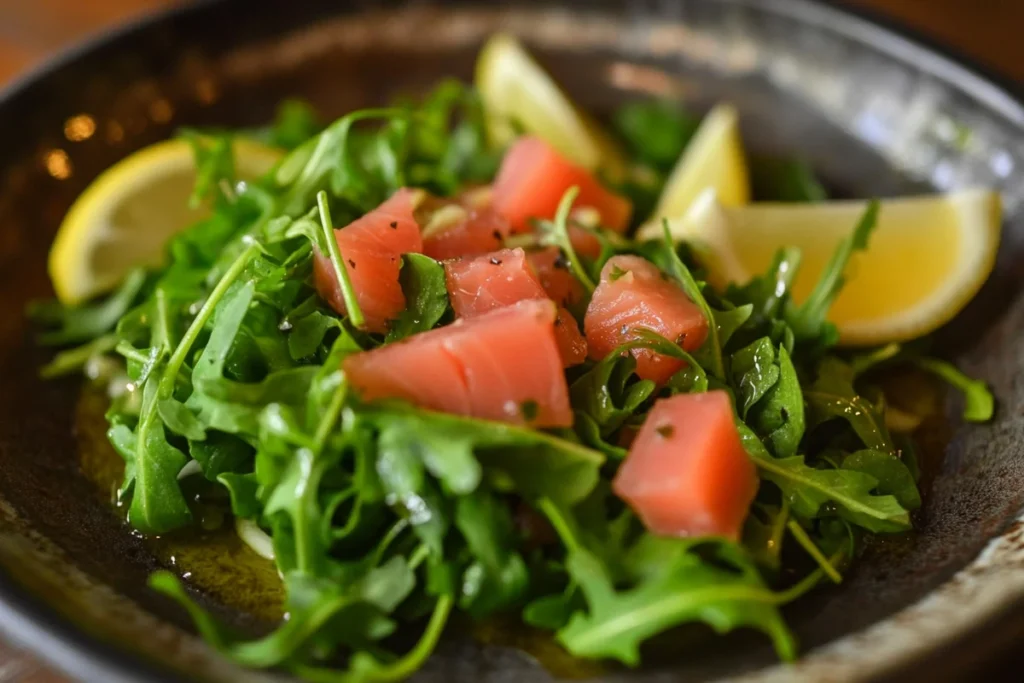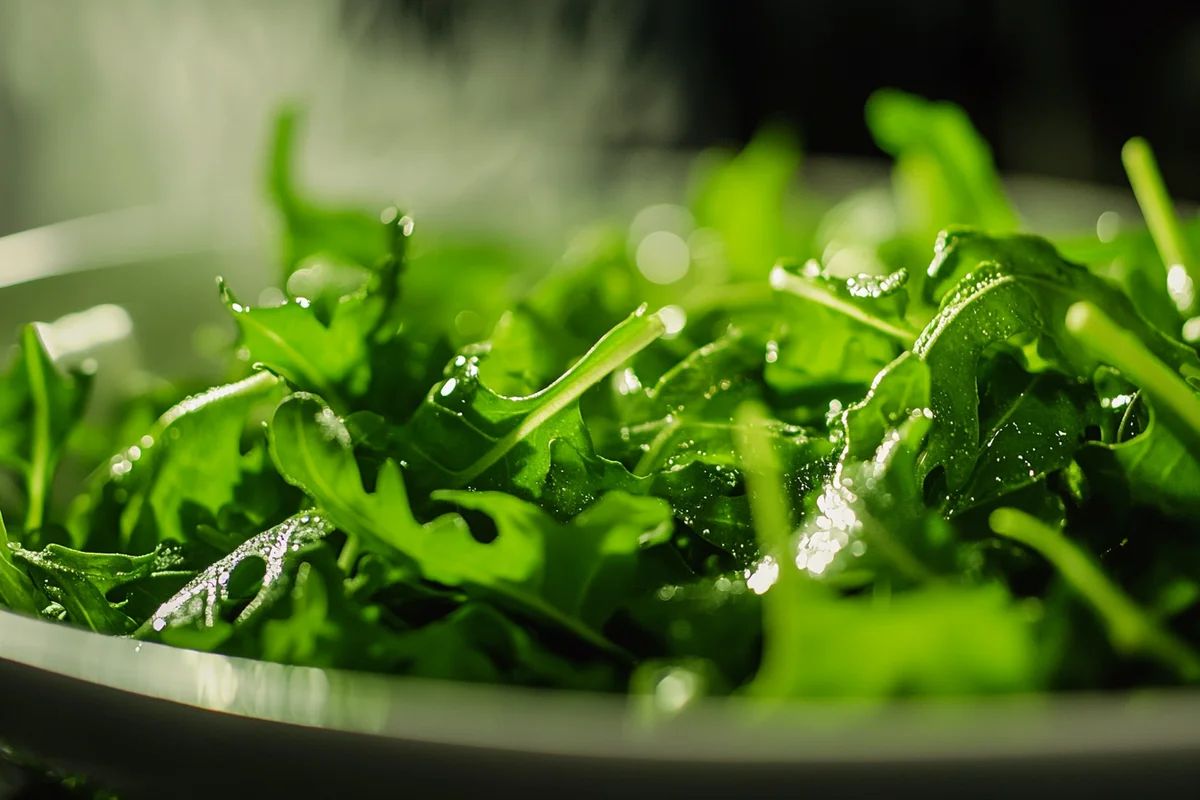Introduction to Rocket Salad
Why Rocket Salad Stands Out in European Kitchens
Rocket salad, also called arugula in the United States, is a leafy green with a peppery flavor. It’s a favorite ingredient in European kitchens.. But what is rocket salad in Europe, and why has it become such an integral part of European cuisine? Scientifically known as Eruca vesicaria, this plant belongs to the Brassicaceae family, alongside other greens like kale, broccoli, and mustard.Here’s a revised version of the sentence to ensure it contains fewer than 20 words while maintaining readability and style:
In Europe, rocket salad is a household name, appearing in traditional dishes, modern recipes, and even as a garnish for pasta or pizza. Unlike in the U.S., where people often call it “arugula,” British English uses the term “rocket,” which comes from the French word roquette. These linguistic quirks reflect the green’s rich cultural journey across the continent.
Rocket salad has deep Mediterranean origins, with centuries of cultivation for both culinary and medicinal purposes. Ancient Romans and Greeks praised its bold flavor and health benefits, using it not only as a food but also as a remedy for digestive ailments. Today, rocket salad has cemented its reputation as a trendy, health-conscious ingredient that is as versatile as it is nutritious.
Why is Rocket Salad So Popular in Europe?
Europeans adore rocket salad for a variety of reasons, not least of which is its adaptability. Its unique flavor profile pairs beautifully with Mediterranean staples like olive oil, lemon juice, and fresh herbs. Moreover, its availability across local markets and supermarkets has made it a convenient choice for everyday meals. Unlike more delicate greens, rocket’s peppery tang adds a bold note to dishes without overpowering other ingredients, which makes it a must-have in everything from simple salads to elaborate feasts.
Another factor driving rocket’s popularity is its health appeal. Europeans are increasingly drawn to nutritious ingredients, and rocket ticks all the right boxes. Packed with antioxidants, vitamins, and minerals, it’s a fantastic choice for those seeking to boost their health naturally. We’ll explore more of its nutritional benefits in an upcoming section.
Rocket salad’s European identity also ties into its use in traditional cuisines. In Italian cooking, for instance, fresh rucola (the Italian term for rocket) often accompanies thin-crust pizzas, while French recipes frequently incorporate roquette into sophisticated salad blends.Even in Northern Europe, where heavier root-vegetable dishes dominate, people embrace rocket for its freshness and how it balances richer flavors.
Rocket Salad: A Leafy Green With a Global Reach
While rocket salad is deeply rooted in Europe, its popularity reaches far beyond the continent. People across the Mediterranean, the Middle East, and parts of Asia enjoy it in a variety of culinary traditions.That said, its European roots and widespread availability make it a standout green across the region, cherished for both its flavor and nutritional punch.
With a history that spans centuries and a versatility that suits virtually any dish, it’s no wonder that rocket salad has become a kitchen staple in Europe. Whether you’re new to this leafy green or already a fan, there’s much to explore about what makes rocket salad so special—starting with its fascinating origins. Stay tuned!

The Origin and History of Rocket Salad
From Ancient Roots to Modern Tables: The Story of Rocket
Rocket salad, or Eruca vesicaria, has a history as rich and flavorful as its peppery leaves. This beloved leafy green can trace its origins to the Mediterranean basin, where it thrived in the mild climates and fertile soils of Southern Europe, North Africa, and Western Asia. Its history stretches back thousands of years, with evidence suggesting that ancient civilizations were cultivating rocket as early as the Roman Empire.
The ancient Romans, for instance, highly valued rocket for its bold flavor and believed it had aphrodisiac properties. It was commonly grown in herb gardens alongside other staples like parsley, mint, and basil. The Romans used rocket not only as a food ingredient but also as a medicinal herb, praising its ability to aid digestion and stimulate appetite. Even before the Romans, the Greeks were known to enjoy this leafy green in their diets, often mixing it with honey and vinegar to balance its spicy taste.
Rocket’s journey didn’t stop there. During the Middle Ages, it was cultivated across Europe, often in monastery gardens, where monks experimented with its culinary and medicinal uses. The plant was considered a symbol of vitality and was often added to the diets of those seeking strength and energy. Over time, its reputation spread beyond the Mediterranean, eventually becoming a staple ingredient in kitchens throughout Europe.
Naming Conventions Across Europe
One of the most fascinating aspects of rocket salad is its many names across different European countries. The English term “rocket” comes from the French word roquette, which was borrowed from the Italian rucola or ruchetta. These names, in turn, can be traced back to the Latin word eruca, which was used to describe a variety of leafy plants.
In Italy, rocket is known as rucola, and it plays a starring role in many traditional dishes, such as insalata di rucola (rocket salad) and as a topping for pasta and pizza. The French, who call it roquette, often use it in gourmet salads alongside goat cheese, walnuts, and figs. Meanwhile, in Spain, it’s referred to as rúcula, and in Germany, it goes by the name Rauke. Each country has its unique way of incorporating this versatile green into their culinary traditions.
It’s interesting to note that the name “arugula,” which is used in the United States, is derived from the same Italian root word rucola. However, the term “rocket” has remained dominant in British English, further emphasizing the cultural differences in how this leafy green is perceived and used across the globe.
Rocket Salad in Modern European Cuisine
In today’s Europe, rocket salad enjoys a status that blends its historic significance with modern culinary trends. It has become a symbol of healthy eating, often featured in dishes at trendy restaurants and home kitchens alike. Its historical journey from ancient Rome to contemporary Europe highlights its enduring appeal and adaptability.
Rocket is not just a green—it’s a testament to how food travels through time, adapting to new cultures while retaining its core identity. From monastery gardens in the Middle Ages to gourmet restaurants in Paris, rocket salad’s story is one of resilience, versatility, and cultural significance.
Nutritional Profile and Health Benefits

A Nutritional Powerhouse: Health Benefits of Rocket Leaves
Rocket salad isn’t just a delicious addition to your meal; it’s also a powerhouse of nutrition. Known for its low calorie count and high nutrient density, this leafy green is the perfect choice for anyone seeking to improve their diet without sacrificing flavor. A typical 100-gram serving of rocket leaves contains only around 25 calories, making it an excellent option for weight-conscious individuals.
But rocket is more than just low in calories—it’s packed with essential vitamins and minerals. It’s an excellent source of Vitamin K, which is crucial for blood clotting and bone health, as well as Vitamin A, which supports healthy skin and eyesight. Additionally, rocket is rich in Vitamin C, an antioxidant that boosts your immune system and helps protect cells from damage caused by free radicals.
Rocket also delivers significant amounts of calcium, magnesium, and potassium, minerals that play a vital role in muscle function, bone health, and maintaining proper hydration. Its iron content, while moderate, makes it a great choice for those looking to support red blood cell production, especially when paired with Vitamin C-rich foods to enhance absorption.
And let’s not forget the fiber content! Rocket salad contains dietary fiber, which aids digestion, keeps you feeling full longer, and supports gut health. This nutrient-packed profile is what makes rocket salad a staple in health-conscious diets across Europe.
Health Benefits of Rocket Salad
The health benefits of rocket salad are as impressive as its nutrient content. Let’s dive into how this peppery green can boost your well-being:
1. Supports Heart Health
Rocket is part of the cruciferous vegetable family, which includes other superfoods like kale and broccoli. These vegetables are known for their ability to support cardiovascular health. Rocket contains nitrates, compounds that help lower blood pressure by improving blood flow. Its antioxidant content also protects the heart by reducing inflammation and oxidative stress.
2. Boosts Immunity
The high levels of Vitamin C in rocket salad contribute to a stronger immune system. Vitamin C helps stimulate the production of white blood cells, which are essential for fighting off infections. This is particularly useful during cold and flu season, when your body needs all the help it can get to stay healthy.
3. Aids Digestion
Rocket’s fiber content makes it a great choice for promoting healthy digestion. Dietary fiber helps regulate bowel movements and feeds beneficial gut bacteria, which are essential for overall gut health. Moreover, rocket’s slightly bitter taste is believed to stimulate digestive enzymes, making it easier for your body to break down food.
4. May Reduce the Risk of Chronic Diseases
The antioxidants in rocket salad, such as beta-carotene and flavonoids, help protect your cells from damage caused by free radicals. This reduces your risk of developing chronic diseases like cancer, diabetes, and neurodegenerative conditions. Studies on cruciferous vegetables suggest that their natural compounds may even have cancer-fighting properties, although more research is needed to confirm this.
5. Supports Bone Health
Thanks to its high levels of Vitamin K, rocket salad can be a fantastic addition to your diet if you want to maintain strong, healthy bones. Vitamin K plays a critical role in calcium absorption and bone mineralization, reducing the risk of osteoporosis and fractures as you age.
6. Helps With Weight Management
Rocket salad’s low calorie and high nutrient profile make it an excellent choice for those looking to manage their weight. It’s light yet satisfying, and its bold flavor ensures that you don’t need to add heavy dressings or toppings to enjoy it. Pair it with a drizzle of olive oil and lemon juice, and you have a healthy, flavorful dish that won’t break the calorie bank.
Why Europeans Love Rocket Salad for Health
In Europe, the emphasis on fresh, seasonal, and nutrient-dense foods has made rocket salad a favorite among health-conscious eaters. It’s commonly incorporated into Mediterranean diets, which are renowned for their heart-health benefits. Europeans often pair rocket with other wholesome ingredients like tomatoes, olive oil, and lean proteins to create meals that are both nutritious and delicious.
Rocket salad’s versatility also means it fits seamlessly into various dietary preferences. Whether you’re vegetarian, vegan, gluten-free, or simply looking to add more greens to your plate, rocket is an easy and accessible choice.
The next time you’re assembling a salad or searching for a nutritious garnish for your meal, consider reaching for rocket leaves. With their impressive health benefits and vibrant flavor, they’re a simple way to make your meals both tastier and healthier.
Cultivation and Availability in Europe
The Art of Growing Rocket: Europe’s Approach to Farming
Rocket salad, despite its elegant appeal on dinner plates, is remarkably easy to grow. In Europe, where farming practices emphasize sustainability and seasonality, rocket thrives both in commercial farms and backyard gardens. It’s considered a cool-season crop, flourishing in the mild climates typical of Mediterranean and temperate regions across the continent.
Rocket is a hardy plant that grows quickly, often reaching maturity in just three to four weeks. This speedy growth cycle makes it a favorite for farmers and home gardeners alike. European farmers usually plant rocket in early spring or late summer, as the plant prefers cooler weather. It grows best in well-drained soil with plenty of organic matter, which is abundant in many parts of Europe, especially in countries like Italy, France, and Spain.
To ensure the peppery flavor that rocket is known for, farmers aim to grow it in slightly sandy soils and under full sun. Interestingly, the flavor of rocket can vary based on growing conditions. Leaves grown in warmer climates tend to have a milder taste, while cooler temperatures bring out its spicier, nuttier notes. This variability makes rocket salad a dynamic ingredient, with subtle flavor differences depending on where in Europe it’s grown.
Sustainability is a key focus in European rocket cultivation. Organic farming methods, which avoid synthetic fertilizers and pesticides, are commonly used to grow rocket. These practices not only preserve the plant’s nutritional integrity but also protect local ecosystems. As demand for organic produce rises, rocket salad has become a star ingredient in eco-conscious kitchens across the continent.
Where to Find Rocket Salad in Europe
Rocket salad is widely available across Europe, making it an easy addition to both everyday meals and special occasions. You’ll find it in an array of settings, from bustling farmer’s markets to high-end grocery stores, reflecting its broad appeal.
In Mediterranean countries like Italy and Greece, fresh rocket is often sold in open-air markets, where locals select bunches of crisp leaves that have been harvested just that morning. In these regions, rocket isn’t merely a side ingredient—it’s a staple that’s used in everything from salads to pasta and even soups.
Further north, in countries like Germany and the United Kingdom, rocket is readily available in supermarkets and health food stores. Pre-washed and bagged rocket is a convenient option for busy households, while fresh, unprocessed bunches can often be found in organic stores or farm shops.
Farm-to-table restaurants across Europe have also embraced rocket salad, using it to highlight the freshness and seasonality of their dishes. For example, a trendy café in France might serve a roquette salad with goat cheese and walnuts, while an Italian trattoria might top a thin-crust pizza with freshly picked rucola.
Additionally, rocket salad has become a fixture in urban gardening and balcony farming trends. Europeans with limited outdoor space are increasingly growing rocket in pots or small raised beds, taking advantage of the plant’s fast growth and low maintenance. With just a bit of water and sunlight, even novice gardeners can enjoy a fresh supply of rocket right at home.
Rocket Salad: From Field to Fork
Rocket’s widespread availability in Europe is a testament to its popularity and versatility. Whether you’re wandering through an open-air market in Barcelona or grabbing groceries at a London supermarket, fresh rocket is never far from reach. Its ability to grow in a variety of climates and its adaptability to organic farming methods have made it a sustainable, health-conscious choice for consumers across the continent.
By bridging the gap between tradition and modernity, rocket salad has cemented its place as a staple of European cuisine. With its unique flavor, ease of cultivation, and availability in nearly every corner of Europe, it’s no wonder this leafy green has stood the test of time.
Culinary Uses of Rocket Salad
Creative Ways Rocket Enhances European Cuisine
Rocket salad is a culinary gem that plays a starring role in many traditional European dishes. Its signature peppery flavor adds a distinct personality to meals, making it a versatile ingredient for both simple and gourmet creations. From the sunny Mediterranean to the chillier climates of Northern Europe, rocket has become a kitchen staple for its ability to enhance nearly any dish.
In Italy, rucola is an essential component of the classic Insalata di Rucola, a simple yet elegant salad made with fresh rocket leaves, shaved Parmesan cheese, and a drizzle of olive oil and balsamic vinegar. This dish highlights the earthy bitterness of the rocket while balancing it with creamy, salty, and sweet notes. Italians also love to sprinkle fresh rocket atop thin-crust pizzas, where the warmth of the pizza slightly wilts the leaves, releasing their nutty aroma.
In France, roquette is often featured in gourmet salads paired with ingredients like goat cheese, caramelized onions, or roasted beets. Its sharp flavor serves as a counterpoint to the richness of the cheese or the sweetness of the vegetables. Meanwhile, in Greece, rocket often appears in vibrant Mediterranean salads, mingling with tomatoes, cucumbers, olives, and feta cheese for a refreshing and hearty dish.
In Northern Europe, where heavier and richer meals are common, rocket provides a burst of freshness to balance out hearty fare. It’s not unusual to see rocket served alongside roasted meats or blended into creamy soups as a garnish. Whether as a primary ingredient or a finishing touch, rocket salad elevates dishes with its bold, zesty flavor.
How to Prepare and Store Rocket Salad
Rocket salad is incredibly easy to prepare, but a little care can go a long way in preserving its fresh taste and nutritional value. To get the most out of your rocket leaves, follow these simple tips for preparation and storage.
1. Washing Rocket Leaves
Since rocket grows close to the ground, its leaves can sometimes be sandy or gritty. Always wash the leaves thoroughly under cold running water. Gently rub them to remove dirt and debris, then dry them using a salad spinner or by patting them with a clean kitchen towel. Ensuring the leaves are dry is especially important if you’re planning to toss them with dressing, as water can dilute the flavors.
2. Storing Rocket for Freshness
Rocket is best enjoyed fresh, but if you need to store it, keep it in the refrigerator in an airtight container or a plastic bag lined with paper towels. The paper towels will absorb excess moisture, helping the leaves stay crisp for up to three days. Avoid storing rocket near fruits like apples or bananas, as the ethylene gas they release can cause the leaves to wilt faster.
3. Cooking With Rocket
Rocket is typically eaten raw to preserve its vibrant flavor and texture, but it can also be lightly cooked. Tossing it into a hot dish—like pasta, risotto, or soup—just before serving allows it to wilt slightly without losing its characteristic spiciness. When using rocket in cooked recipes, pair it with bold ingredients like garlic, lemon, or chili to enhance its taste.
Creative Ways to Use Rocket Salad
Beyond traditional recipes, there are countless ways to incorporate rocket salad into your meals. Here are some creative ideas to inspire you:
- Rocket Pesto: Blend fresh rocket leaves with olive oil, Parmesan cheese, garlic, and nuts like walnuts or almonds for a spicy twist on classic pesto. Use it as a pasta sauce or spread it on sandwiches.
- Rocket Smoothies: Add a handful of rocket to your morning smoothie for an extra nutrient boost. Pair it with sweet fruits like pineapple or mango to balance its peppery flavor.
- Rocket Wraps: Use large rocket leaves as a wrap for sandwiches or tacos. Their sturdy texture makes them a healthy alternative to bread or tortillas.
- Rocket Salad with Fruits: Combine rocket with fresh fruits like pears, apples, or figs, along with nuts and a light honey-mustard dressing, for a sweet and savory side dish.
- Grilled Rocket: For a unique twist, lightly grill rocket leaves for a smoky, nutty flavor. This works particularly well as a topping for flatbreads or as a side dish to grilled meats.
Why Rocket Salad is a European Favorite
Rocket salad’s versatility is one of the reasons it has become so popular across Europe.Rocket pairs well with a variety of ingredients, from sweet and tangy to rich and creamy. Whether folded into a hearty pasta or tossed in a light summer salad, it adds a bold flavor that few other greens can match.
For food lovers who appreciate simplicity, rocket salad shines on its own. A bowl of fresh rocket leaves drizzled with high-quality olive oil, a squeeze of lemon, and a sprinkle of sea salt can stand as a complete dish, capturing the essence of European cooking: fresh, flavorful, and uncomplicated.

Frequently Asked Questions (FAQs)
Is rocket salad the same as arugula?
Yes, rocket salad and arugula are essentially the same plant, but they go by different names depending on the region. In Europe, it’s most commonly referred to as rocket (or roquette in French and rucola in Italian), while in the United States and Canada, it’s called arugula. Both terms refer to the leafy green Eruca vesicaria, which is known for its peppery and slightly nutty flavor.
Can you eat rocket salad raw?
Absolutely! Rocket salad is often enjoyed raw, which helps preserve its vibrant peppery flavor and nutritional value. It’s a popular base for salads, an aromatic topping for pizzas, and even a garnish for soups and pasta. However, rocket can also be lightly cooked or wilted, which slightly mellows its sharp taste and adds depth to warm dishes.
What does rocket salad taste like?
Rocket salad has a distinctive peppery and slightly bitter flavor that sets it apart from other leafy greens. The taste can be described as bold, with nutty undertones, and it adds a zesty kick to any dish. Interestingly, its flavor can vary depending on how and where it’s grown. Rocket harvested in cooler climates tends to be spicier, while leaves from warmer regions may have a milder, nuttier taste.
Where can I buy fresh rocket salad in Europe?
Rocket salad is widely available across Europe, from bustling farmer’s markets to local supermarkets. In countries like Italy, France, and Spain, you can find fresh, organic rocket at open-air markets, often sold by local farmers. In larger cities, pre-packaged rocket is readily available in health food stores and grocery chains like Tesco, Carrefour, and Lidl. For those with a green thumb, you can even grow rocket in your own garden or balcony, as it thrives in European climates.
How do I make a rocket salad dressing?
A simple and delicious dressing can elevate rocket salad to new heights. To make a classic European-style rocket dressing, mix together:
- 2 tablespoons of extra virgin olive oil
- 1 tablespoon of freshly squeezed lemon juice or balsamic vinegar
- 1 teaspoon of Dijon mustard
- A pinch of sea salt and freshly ground black pepper
Whisk these ingredients together and drizzle over your fresh rocket leaves. For extra flavor, add a teaspoon of honey for sweetness or a minced clove of garlic for a zesty kick.
Is rocket salad good for weight loss?
Rocket salad is a great choice for weight loss because it’s low in calories but packed with nutrients. With only 25 calories per 100 grams, it offers vitamins, minerals, and fiber without adding extra calories. Its bold, peppery flavor eliminates the need for heavy dressings, making it a light yet satisfying addition to meals.
Conclusion and Final Thoughts
The Timeless Charm of Rocket in Europe
Rocket salad has a unique peppery flavor and versatile nature, making it a favorite in European cuisine. It started humbly in the Mediterranean but is now widely available in markets and kitchens across the continent. Known as rocket, arugula, rucola, or roquette, this leafy green balances bold flavor with impressive nutrition.
Rocket salad’s history dates back to ancient Rome and Greece, highlighting its cultural significance. Its nutrient-rich profile has earned it the title of a modern superfood. More than just a simple green, rocket is a health booster, a culinary staple, and a symbol of Europe’s love for fresh ingredients.
For those new to rocket, its vibrant taste and adaptability open up a world of culinary possibilities. Whether you toss it raw into a salad, use it as a pizza topping, blend it into pesto, or garnish a soup, it never fails to elevate your dish. Moreover, its availability and ease of cultivation make it accessible to everyone, from professional chefs to home gardeners.
Rocket salad captures the essence of European cuisine by focusing on simple, fresh, and nutritious ingredients. It enhances both flavor and health benefits in any meal. Next time you spot rocket at the market, grab a bunch and let this ancient green add European charm to your plate.

